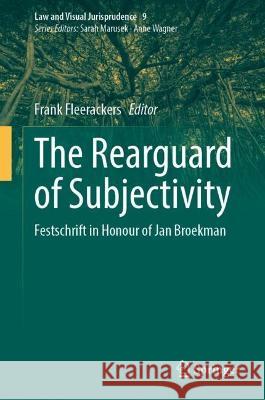The Rearguard of Subjectivity: Festschrift in Honour of Jan Broekman » książka
The Rearguard of Subjectivity: Festschrift in Honour of Jan Broekman
ISBN-13: 9783031268540 / Angielski / Twarda / 2023 / 224 str.
The Rearguard of Subjectivity: Festschrift in Honour of Jan Broekman
ISBN-13: 9783031268540 / Angielski / Twarda / 2023 / 224 str.
(netto: 575,06 VAT: 5%)
Najniższa cena z 30 dni: 539,74
ok. 16-18 dni roboczych.
Darmowa dostawa!
Edmund Husserl’s ideas, informed by Kant’s Critiques, constituted a point of departure when rereading philosophical problems of subject and subjectivity. In his “Phänomenologie und Egologie” (1961/63), Jan Broekman revealed how Husserl analysed the “Split Ego” notion in Kant’s vision, which became fundamental for his phenomenology. The form and function of subjectivity were likewise positioned in psychiatry and literature, as well as in aesthetics, as Jan Broekman’s texts on ‘cubism’ demonstrated. Problems of ‘language’ unfolded in studies on topics ranging from the texts of Ezra Pound to the dialogic insights of Martin Buber, all of which were involved in the development of semiotics. Two themes accompanied these insights: the notion and later Parisian mainstream called structuralism, and the urgent need to arrive at deeper insights into the links between Marxism and phenomenology. Central language concepts also played a part: as early as 1986, Jan Broekman published on ‘semiology and medical discourse’, and in 1992 on ‘neurosemiotics’, before addressing the link between speech act and (legal as well as social) freedom in 1993. In all these works, the subject and the atmosphere of subjectivity were essential aspects. In addition to his writing, Jan Broekman gave courses on current philosophical issues, law and medicine until retiring in 1996, and in his “Intertwinements of Law and Medicine” revisited subjectivity aspects, while also offering a synthetic view.In this Festschrift in honour of Jan Broekman, the contributions address the analogue/digital dichotomy in semiotics, the multicultural self in language and semiotics, semiology and legal discourse, the legal subject and the atmosphere of subjectivity, intertwinements of law and medicine, the semiotics of law in legal education, signs in law and legal discourse, making meaning in law, and legal speech acts.











